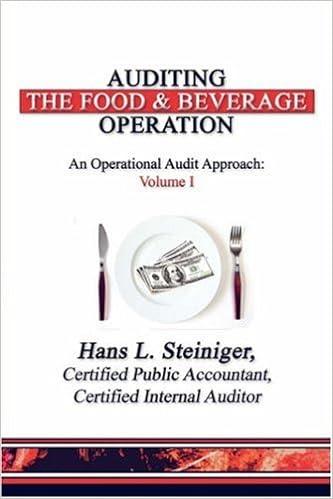Question
Midwest Entertainment has four operating divisions: Bus Charters, Lodging, Concerts, and Ticket Services. Each division is a separate segment for financial reporting purposes. Revenues and
Midwest Entertainment has four operating divisions: Bus Charters, Lodging, Concerts, and Ticket Services. Each division is a separate segment for financial reporting purposes. Revenues and costs related to outside transactions were as follows for the past year (dollars in thousands):
| Bus Charters | Lodging | Concerts | Ticket Services | |||||||||
| Revenues | $ | 11,700 | $ | 5,350 | $ | 4,480 | $ | 1,650 | ||||
| Costs | 7,850 | 3,540 | 3,350 | 1,550 | ||||||||
Bus Charters Division participates in a frequent guest program with Lodging Division. During the past year, Bus Charters reported that it traded lodging award coupons for travel that had a retail value of $1.3 million, assuming that the travel was redeemed at full fares. Concerts Division offered 20 percent discounts to Midwests bus passengers and lodging guests. These discounts to bus passengers were estimated to have a retail value of $360,000. Midwest's lodging guests redeemed $130,000 in concert discount coupons. Midwests hotels also provided rooms for Bus Charterss employees (drivers and guides). The value of the rooms for the year was $660,000.
Ticket Services Division sold chartered tours for Bus Charters valued at $220,000 for the year. This service for intracompany lodging was valued at $100,000. It also sold concert tickets for Concerts; tickets for intracompany concert admission were valued at $55,000.
While preparing all of these data for financial statement presentation, Lodging Divisions controller stated that the value of the bus coupons should be based on their differential and opportunity costs, not on the full fare. This argument was supported because travel coupons are usually allocated to seats that would otherwise be empty or that are restricted similar to those on discount tickets. If the differential and opportunity costs were used for this transfer price, the value would be $250,000 instead of $1.3 million. Bus Charterss controller made a similar argument concerning the concert discount coupons. If the differential cost basis were used for the concert coupons, the transfer price would be $55,000 instead of the $360,000.
Midwest reports assets in each division as follows (dollars in thousands):
| Bus Charters | $ | 48,250 | |
| Lodging | 19,650 | ||
| Concerts | 15,600 | ||
| Ticket Services | 3,000 | ||
Midwest Entertainment has four operating divisions: Bus Charters, Lodging, Concerts, and Ticket Services. Each division is a separate segment for financial reporting purposes. Revenues and costs related to outside transactions were as follows for the past year (dollars in thousands):
| Bus Charters | Lodging | Concerts | Ticket Services | |||||||||
| Revenues | $ | 11,700 | $ | 5,350 | $ | 4,480 | $ | 1,650 | ||||
| Costs | 7,850 | 3,540 | 3,350 | 1,550 | ||||||||
Bus Charters Division participates in a frequent guest program with Lodging Division. During the past year, Bus Charters reported that it traded lodging award coupons for travel that had a retail value of $1.3 million, assuming that the travel was redeemed at full fares. Concerts Division offered 20 percent discounts to Midwests bus passengers and lodging guests. These discounts to bus passengers were estimated to have a retail value of $360,000. Midwest's lodging guests redeemed $130,000 in concert discount coupons. Midwests hotels also provided rooms for Bus Charterss employees (drivers and guides). The value of the rooms for the year was $660,000.
Ticket Services Division sold chartered tours for Bus Charters valued at $220,000 for the year. This service for intracompany lodging was valued at $100,000. It also sold concert tickets for Concerts; tickets for intracompany concert admission were valued at $55,000.
While preparing all of these data for financial statement presentation, Lodging Divisions controller stated that the value of the bus coupons should be based on their differential and opportunity costs, not on the full fare. This argument was supported because travel coupons are usually allocated to seats that would otherwise be empty or that are restricted similar to those on discount tickets. If the differential and opportunity costs were used for this transfer price, the value would be $250,000 instead of $1.3 million. Bus Charterss controller made a similar argument concerning the concert discount coupons. If the differential cost basis were used for the concert coupons, the transfer price would be $55,000 instead of the $360,000.
Midwest reports assets in each division as follows (dollars in thousands):
| Bus Charters | $ | 48,250 | |
| Lodging | 19,650 | ||
| Concerts | 15,600 | ||
| Ticket Services | 3,000 | ||
b. What are the operating profits for each Midwest division using the differential cost basis for pricing transfers? (Enter your answers in thousands of dollars.)
operating profits
Bus charters
Lodging
Concerts
Ticket services
c. Rank each division by ROI using the transfer pricing methods in requirements (a) and (b). (Round your answers to 2 decimal places.)
operating profits
Bus charters %
Lodging %
Concerts %
Ticket services %
c. Rank each division by ROI using the transfer pricing methods in requirements (a) and (b). (Round your answers to 2 decimal places.)
Bus charters %
Lodging %
Concerts %
Ticket services %
Step by Step Solution
There are 3 Steps involved in it
Step: 1

Get Instant Access to Expert-Tailored Solutions
See step-by-step solutions with expert insights and AI powered tools for academic success
Step: 2

Step: 3

Ace Your Homework with AI
Get the answers you need in no time with our AI-driven, step-by-step assistance
Get Started


